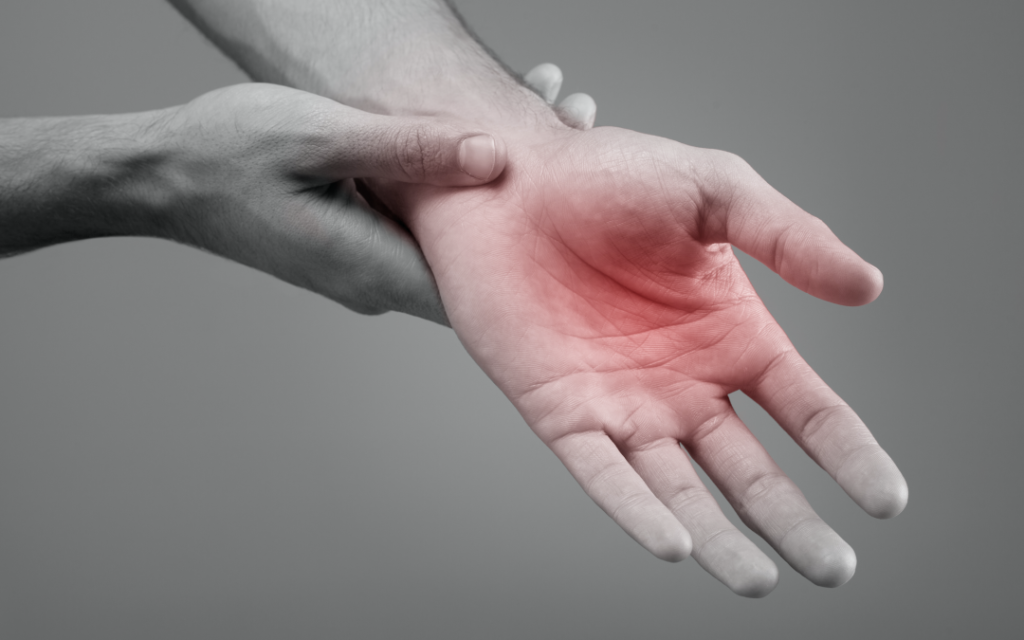Introduction
Carpal Tunnel Syndrome (CTS) is a prevalent condition impacting the hand and wrist, affecting individuals of all ages and backgrounds. It occurs due to pressure on the median nerve within the narrow confines of the carpal tunnel, a rigid and tight passageway on the palm side of your wrist. This blog post explores the early warning signs of CTS, discusses potential causes and risk factors, and offers guidance on when to seek professional medical advice.
Understanding Carpal Tunnel Syndrome
The carpal tunnel is a small canal that runs from the base of the wrist to the lower palm. It is bordered by bones on three sides and a tough band of connective tissue on the fourth, forming a passageway for the median nerve and several tendons. Any swelling or compression in this confined space can pinch the median nerve, leading to the symptoms associated with CTS.
Common Symptoms of Carpal Tunnel Syndrome:
- Numbness or Tingling: Often, the initial symptom of CTS is an intermittent tingling or numbness in the thumb, index, middle fingers, and part of the ring fingers, but not the little finger. This sensation might extend from the wrist up the arm. These symptoms often appear during the night as many people sleep with bent wrists which further compress the carpal tunnel.
- Pain: Some individuals may experience pain in their wrist and the palm side of their hand. This pain can also extend up the arm to the elbow, affecting muscle performance and daily activities, particularly those that involve lifting, gripping, or holding.
- Weakness: Patients might notice an overall weakness in the hand and a tendency to drop objects. This could be due to the numbness in the hand or weakness of the thumb’s pinching muscles, which are also controlled by the median nerve.
Risk Factors Contributing to Carpal Tunnel Syndrome:
- Repetitive Hand Use: Extensive wrist and hand motions can increase pressure on the median nerve, especially if the hand is consistently held lower than the wrist or in a flexed position.
- Pregnancy: Hormonal changes during pregnancy can cause swelling and thus pressure in the carpal tunnel.
- Health Conditions: Diabetes, rheumatoid arthritis, and thyroid gland imbalance are health issues that can contribute to the development of CTS.
- Physical Damage to the Wrist: Wrist fractures or trauma to the wrist which alter the space within the carpal tunnel can create pressure on the median nerve.
- Age and Gender: CTS is more commonly found in women and older adults.
Diagnosing Carpal Tunnel Syndrome
Diagnosis involves a combination of patient history, physical examinations, and confirmatory tests such as nerve conduction studies, which measure the speed of nerve impulses across the wrist.
Preventative Measures
To mitigate the risk of developing CTS, consider the following strategies:
- Ergonomic Adjustments: Set up workstations so that the wrists are not continuously bent or extended. Ergonomic keyboards and mouse pads that elevate the wrist can be beneficial.
- Regular Breaks: Take breaks from repetitive activities to stretch and bend the wrists. This can help reduce pressure on the nerve.
- Hand and Wrist Exercises: Strengthening and stretching exercises can improve the hand and wrist’s resilience to injuries.
- Watch Your Grip: Maintain a relaxed grip during activities involving hand tools; a tight grip exacerbates pressure.
When to See a Doctor
Early diagnosis and treatment are crucial. If you experience persistent symptoms of numbness, tingling, or pain in your hand or wrist, arrange to see a healthcare professional. The first port of call will be your GP, but may also be a physiotherapist or musculoskeletal practitioner, who can diagnose CTS and initiate early treatment. Early intervention can alleviate the symptoms and often prevent permanent damage.
Conclusion
Recognising the early signs of Carpal Tunnel Syndrome and understanding the potential causes can significantly enhance treatment outcomes. At Cardiff Gate Consulting Rooms, we are dedicated to providing comprehensive care tailored to our patients’ individual needs. If you believe you are experiencing signs of CTS, please do not hesitate to contact us to schedule an evaluation and discuss the best treatment options available for you.



